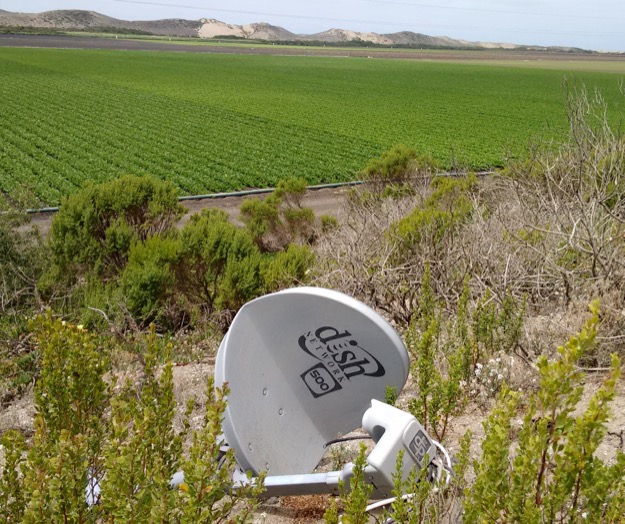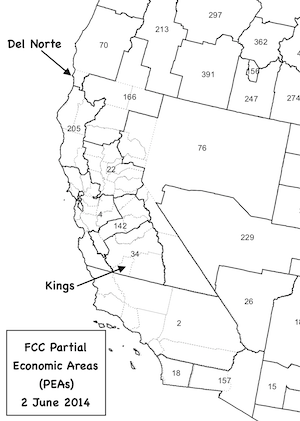
DISH won’t have to build its own 5G network everywhere in California, or even in every county, if the T-Mobile/Sprint merger is approved. Jeff Blum, DISH’s chief Washington, D.C. staff lobbyist, testified at a California Public Utilities Commission hearing on Friday. He ducked and dodged questions about DISH’s exact intentions for the California assets and people that T-Mobile would spin off, under an antitrust settlement reached with the federal justice department, saying plans were still being made, data was still being analysed, decisions were in the hands of other companies and, well, so on.
Topic number one for the hearing was “does the agreement with DISH substantially alleviate any competitive harms of the proposed merger?” In the long run, the answer depends on whether DISH invests enough money – it says $10 billion, others say a lot more – to build a 5G mobile broadband network that will directly compete with those operated by AT&T, Verizon and the combined T-Mobile/Sprint. But DISH’s network won’t have to completely cover California.
An important bit of jargon is “partial economic area” (PEA). The Federal Communications Commission sliced up states and territories into 416 PEAs that represent regional markets. It assigns some mobile broadband spectrum, including the frequencies in the 600 MHz range purchased by DISH, on a PEA by PEA basis. Assuming the merger goes through as is, DISH has until 2025 to build sufficient infrastructure to reach 75% of the population in each of those PEAs.
When pressed about DISH’s plans for rural California, Blum first said that DISH would have to serve all of the state’s 58 counties, or it would face billion dollar fines and/or forfeitures. But further cross examination showed that to be false. He clarified that DISH has 600 MHz spectrum in PEAs that cover all California counties, but its build out obligation is on a PEA, not county, level. Which gives DISH two options for walking away from any given California county or rural community.
First, PEAs typically encompass several counties and cross state lines, as the map below illustrates. One county that got particular attention during Blum’s cross examination – because T-Mobile made a big deal of it – is Kings, in the San Joaquin Valley. It shares a PEA with Fresno, Tulare and Madera counties. DISH could ignore Kings and Madera counties completely, along with a few low income Fresno and Tulare communities, and still easily meet its 75% population coverage requirement.

Click for the big picture.
Del Norte County is in an even more precarious position. It’s the sole California county in a PEA that includes six Oregon counties and it’s home to only 3% of the total population.
There are other examples. If you want to run the numbers, my spreadsheet is here.
Second, DISH could redline an entire PEA if serving it isn’t sufficiently profitable. “If we fail to build in one PEA then we lose that PEA”, Blum said.
Right. Losing responsibility for a service area that you don’t want to serve is a blessing, not a mortal blow.
Blum also outlined a third option: DISH could, in effect, lease frequencies to small local wireless operators. In “a very, very rural area, for example…we see an opportunity to partner with them”, he said. In other words, they’ve thought this through.
DISH’s plans, or lack thereof, for serving rural communities might not matter. Its worth as a competitive counterweight in the mobile broadband marketplace will be determined in urban counties. It would be replacing Sprint, which doesn’t provide credible rural service in California anyway and whose competitive value comes from the heat it generates in urban and suburban communities with denser and richer populations.
Going by the current schedule for the CPUC’s review of the T-Mobile/Sprint/DISH ménage, the next step is for the companies and opponents of the deal to file their arguments one way or the other. Assuming no surprises, that’ll happen on 20 December 2019, which will set the stage for a final CPUC vote as early as February.
Links to the stack of arguments and exhibits everyone has filed are here.
Jeff Blum is not my dad. My dad was Geoff Blum. My clients include California cities who do business with T-Mobile. I like to think that has no bearing on my commentary, but I like to think I’m good looking too. My dad was amused by that. Take it for what it’s worth.
